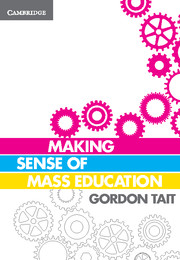Book contents
- Frontmatter
- Contents
- Acknowledgements
- INTRODUCTION
- PART 1 RE-ASSESSING THE THREE PILLARS: MODERN AND POSTMODERN SOCIOLOGIES OF EDUCATION
- PART 2 THE FOUNDATIONS OF AN ALTERNATIVE APPROACH: EDUCATION AND GOVERNANCE
- PART 3 CULTURAL CONTEXTS OF CONTEMPORARY EDUCATION
- CHAPTER 7 THE MEDIA
- CHAPTER 8 POPULAR CULTURE
- CHAPTER 9 TECHNOLOGY
- PART 4 PHILOSOPHY AND MASS EDUCATION
- CONCLUSION
- References
- Index
CHAPTER 8 - POPULAR CULTURE
from PART 3 - CULTURAL CONTEXTS OF CONTEMPORARY EDUCATION
- Frontmatter
- Contents
- Acknowledgements
- INTRODUCTION
- PART 1 RE-ASSESSING THE THREE PILLARS: MODERN AND POSTMODERN SOCIOLOGIES OF EDUCATION
- PART 2 THE FOUNDATIONS OF AN ALTERNATIVE APPROACH: EDUCATION AND GOVERNANCE
- PART 3 CULTURAL CONTEXTS OF CONTEMPORARY EDUCATION
- CHAPTER 7 THE MEDIA
- CHAPTER 8 POPULAR CULTURE
- CHAPTER 9 TECHNOLOGY
- PART 4 PHILOSOPHY AND MASS EDUCATION
- CONCLUSION
- References
- Index
Summary
This chapter argues that the relationship between popular culture and the classroom remains a contentious issue. Its presence has been used as a symbol of how much our culture has declined, and how educationally corrupted our schools have become, while its absence has been used to suggest our schools are out of touch with their primary constituency – young people. This is not a simple issue to address; even the notion of ‘culture’ itself is subject to considerable disagreement.
Myth #1 Popular culture is rubbish – in terms of taste, it's awful; as an object of study, it's irrelevant
Even though most of us consume various forms of popular culture on a daily basis, we still know it's the media equivalent of junk food; it's not really worth eating, and it's certainly not worth studying.
The division between ‘high’ and ‘low/popular’ culture is largely a false binary, but still one that has significant implications for how we approach our most familiar cultural forms. It is fair to say that the label of ‘high’ culture is often more about its audience than its content, and that some popular culture can be of great value. Significantly, the academic study of popular culture can tell us much about ourselves as a society.
Myth #2 Teachers need to be up to date with student cultures
If you want to connect with students, you have to be able to communicate with them on their cultural terms. If you can't do that, then you won't be an effective teacher.
This myth operates through the false binary of teacher culture and student culture as mutually exclusive entities. Both groups are consumers of popular culture, and there exist significant areas of overlap as audiences. That said, it is probably useful for teachers to be familiar with various elements of some student cultures, but without therefore having to be consumers of those elements themselves.
- Type
- Chapter
- Information
- Making Sense of Mass Education , pp. 165 - 186Publisher: Cambridge University PressPrint publication year: 2012



